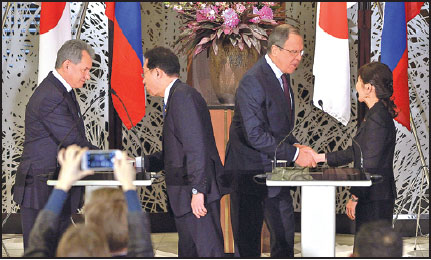 |
|
Japan's Defense Minister Tomomi Inada (right) meets Russia's Foreign Minister Sergey Lavrov (second right) while Russia's Defense Minister Sergei Shoigu (left) shake hands with Japanese Foreign Minister Fumio Kishida on Monday.[Photo/Agencies] |
Japan released its annual report on foreign aid on Tuesday, which shows the country is shifting further away from its traditional official development assistance policy.
The white paper says Japan will help developing countries fight terrorism, as part of its intensified counterterrorism efforts following a spate of deadly incidents last year. Seven Japanese nationals were among those killed in the terrorist attack on a restaurant in Bangladesh in July.
It also says that Japan will continue to help bolster Southeast Asian nations' surveillance capabilities amid China's "rising assertiveness" in the South and East China seas. To this end, it will offer them patrol vessels to maintain maritime security in vital sea lanes.
Japan's foreign aid policy has changed since the country replaced its Official Development Assistance Charter with the Development Cooperation Charter in 2015.
The Official Development Assistance Charter kept military or defense-related activities clearly outside the domain of foreign aid. The Development Cooperation Charter includes new and controversial revisions such as the use of the aid budget for non-combat military purposes.
The shift is part of what Japanese Prime Minister Shinzo Abe calls a "proactive contribution to peace", a concept he first raised in 2014.
The main objectives of Japan's foreign aid have now been extended from pushing economic development and improving people's welfare to "building peace" and "spreading democracy".
Asia is the main focus of Japan's renewed commitment to development cooperation, particularly Southeast Asia, given its "close relationship with Japan and high relevance to its security and prosperity".
Abe, with a 1 trillion yen ($8.7 billion) aid package, went to Manila in January, becoming the first foreign leader to visit the Philippines since Rodrigo Duterte became president last year.
Japan has agreed to build 10 brand-new 44-meter multi-role response vessels for Philippine Coast Guard. The third vessel of the 12.7 billion yen ($107.4 million) project was delivered to the Philippines in early March.
During his visit to Vietnam in January, Abe pledged to provide six patrol vessels to the Southeast nation as a part of a fresh yen loan offer totaling 120 billion yen ($1.05 billion) to help its maritime safety efforts.
When announcing the Development Cooperation Charter in 2015, Abe declared that this new "non-combat" aid would assist in protecting the "rule of law".
Japan's foreign aid policy shift has been under the banner of a clause allowing the country to use its assistance to fund foreign military troops but only for "nonmilitary" activities.
Japan's Foreign Minister Fumio Kishida has justified this by saying that militaries now play an important role in non-military activities such as post-conflict rebuilding and reconstruction.
But even Japanese experts suggest the policy shift is not without problems.
In an interview with the Reuters in 2015, Yoichi Ishii, professor emeritus at Kanagawa University, said: "The government says its aid is only for such purposes as post-disaster rescue. Let's say trucks or helicopters were bought under such programs. The problem is it is impossible to make sure they are used only for such purposes."
As he said, "When it comes to how they are used, it is very difficult to draw a clear line between military and non-military."
The reform of Japan's overseas assistance charter betrays that it is being strategically used as a security policy tool.
The author is China Daily Tokyo bureau chief.
caihong@chinadaily.com.cn

Last weekend, I was hanging out downtown with a friend and my sister. We were walking through a public spare when all of a sudden a heated argument between a student and a middle-aged woman arrested our attention.